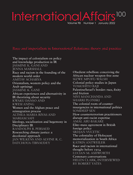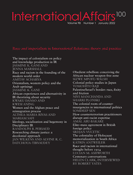Volume 98, Issue 1, January 2022
Front matter
Abstracts
Contributors
Editorial
100 years of International Affairs
2022 marks International Affairs' 100th year. This editorial reflects on the journal's history and outlines plans and goals for its second century, not least ensuring that International Affairs becomes a truly global and inclusive journal.
Race and imperialism in International Relations: theory and practice
Special issue guest-edited by Jasmine K. Gani and Jenna Marshall
The impact of colonialism on policy and knowledge production in International Relations
In the introduction to this special issue, guest-editors Gani and Marshall argue that we must uncover the legacy of race, colonialism and imperialism in International Relations. They problematize the academic–practitioner relationship, asking how this racialized knowledge exchange has influenced theory and policy in IR.
Race and racism in the founding of the modern world order
Acharya reflects on the role of racism in the emergence of the American-led world order and how mainstream scholarship on International Relations has obscured this role. The article argues that the challenge of racism is integral to the emerging research agenda of Global International Relations.
From discourse to practice: Orientalism, western policy and the Arab uprisings
While the ‘Arab Spring’ was met with hope from local populations, western commentators reverted to Orientalist narratives about the inevitability of conflict and sectarianism in the Middle East. Gani demonstrates how this knowledge production had a clear impact, as western states withdrew support from opposition groups.
African experiences and alternativity in International Relations theorizing about security
The authors show how Eurocentrism and methodological whiteness in security studies excludes African experiences as they manifest through hybrid security orders. The article draws on postcolonial discourses to explore how the study of events and processes in Africa could advance IR scholarship.
Women and the Afghan peace and reintegration process
Using feminist and postcolonial analyses, the authors show how colonial interventions, patriarchy and global hierarchies of knowledge production have made women in the Afghan peace processes both highly visible and also silenced. They reflect on the relevance of their research for Afghanistan in 2021.
Ideology, socialization and hegemony in Disciplinary International Relations
This article argues that Disciplinary International Relations (DIR) does not only explain international affairs, but also socializes publics and professionals into a worldview of hegemonic liberalism. In the early twentieth century, UK scholars doubled as defenders of empire, today American scholars double up as policy-makers.
Researching climate justice: a decolonial approach to global climate governance
This article asks how we can develop a decolonial approach to researching climate justice, one which recognizes the agency of diverse populations, particularly those in the Arctic and the Mediterranean. This approach should inform the co-production of research, and current debates on climate justice.
Obedient rebellion: conceiving the African nuclear weapon-free zone
This article questions why nuclear weapon-free zones emerge in some areas and not others. It introduces the concept of ‘obedient rebellion’ to explain the attitude of newly-decolonizing African states to NWFZs and offers insight into the forces shaping the global nuclear order.
Colonial policy studies in Japan: racial visions of Nan'yo, or the early creation of a global South
This article shows how Japanese conceptualization of the ‘Nan'y?’ region (the South Seas) by leading intellectuals and policy-makers was influenced by western ideas. Japanese colonial policy studies created racial hierarchies with the global South at the bottom, bolstering Japanese imperial control.
Between mobile corridors and immobilizing borders: race, fixity and friction in Palestine/Israel
This article looks at the question of ‘national’ borders in racial capitalism through Israel's high-tech border industry. It asks how this border has become a model for the ever-growing global homeland security industry and who helped it become an ‘exportable commodity’.
The colonial roots of counter-insurgencies in international politics
Sen reveals the colonial origins of the scholarly perception that it is appropriate for states to conduct war and violence, while insurgent groups should not. Looking at the EU's work in Palestine, the author argues that understanding the reasons for insurgent politics is essential for effective peacebuilding.
Exploring mechanisms of whiteness: how counterterrorism practitioners disrupt anti-racist expertise
Abu-Bakare demonstrates how race becomes meaningful to the knowledge that is produced about Islamophobia. The article argues that in policy debates on systemic racism, counterterrorism practitioners regulate exchanges with academics through the mechanism of institutionalized whiteness.
Elite–mass agreement in British foreign policy
The article analyses the role of national identity in British foreign policy, through the debate between ‘Anglo-Saxons’ and ‘Europeans’. It highlights the role of both elites and the mass consumer public and argues that critical analyses of knowledge exchange should be attuned to popular common sense.
The coloniality of Holocaust memorialization in post-apartheid South Africa
Memorializing the Holocaust has become a moral obligation and best practice, seen to instill values of democracy and human rights. Using a decolonial perspective, the author shows how this practice subjugates local history, such as apartheid in South Africa, while enacting western governmentality.
Warriors, pacifists and empires: race and racism in international thought before 1914
This article charts racist ideas in early thought on international affairs. It specifically uncovers how debate between two theoretical camps—conservative/proto-realists and liberal/pacifists—created an illusion of critical enquiry, hiding the racist assumptions existing in both camps.
Interview
Centenary conversations
Helen Clark is interviewed by Robert Yates for the first in a new series of ‘Centenary conversations’, celebrating 100 years of International Affairs. They discussed the COVID-19 crisis and reflect on whether the world is doing a better job than it did 100 years ago during the Spanish flu epidemic.




